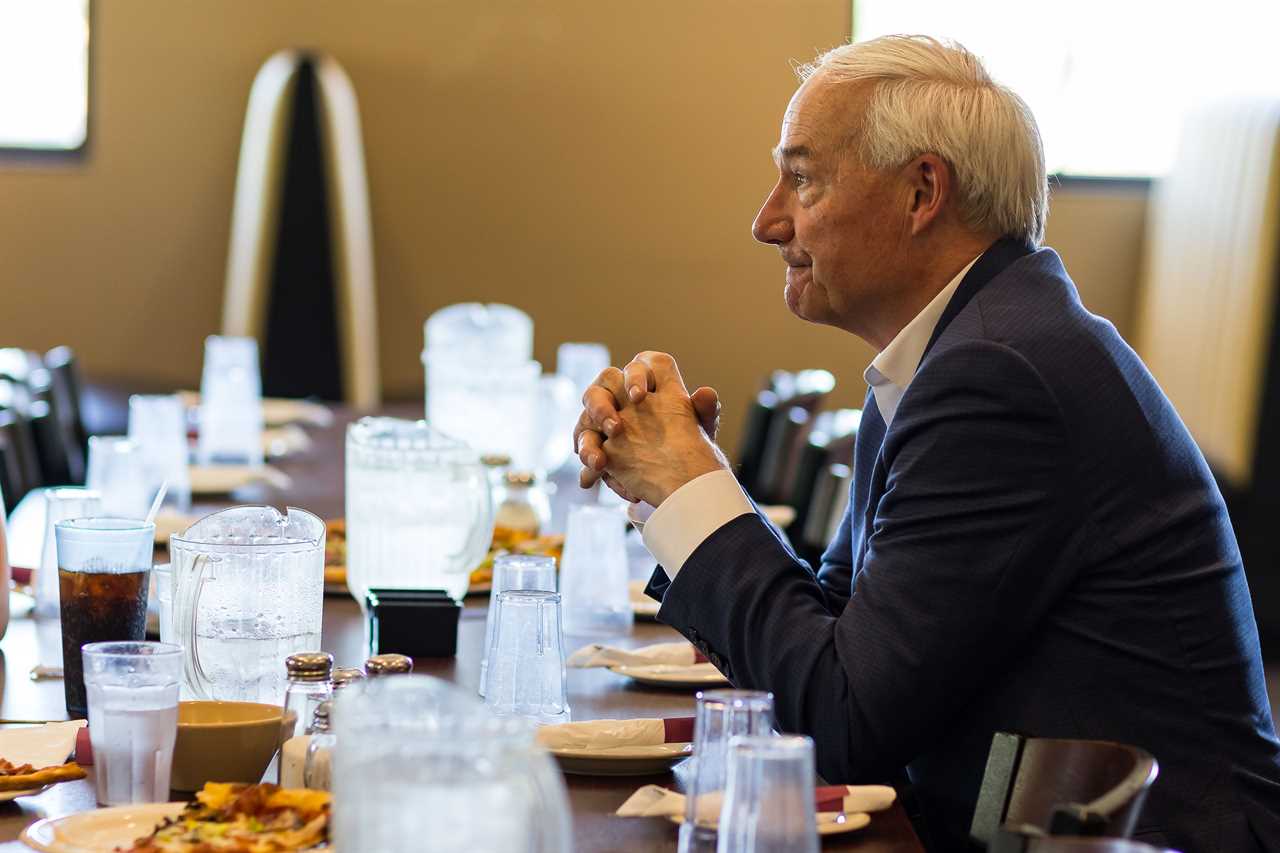
It’s an early mid-June evening in New Hampshire, and Asa Hutchinson — the former Arkansas governor and 2024 presidential candidate — is riding shotgun in a white Nissan SUV, fiddling with his iPhone after another day on the campaign trail. Between glances at his Twitter feed, he calls up the latest RealClearPolitics polling average for the 2024 Republican nomination and scrolls down to see the numbers: Former President Donald Trump, indicted just days prior for mishandling classified documents, towers over Ron DeSantis by 33 points — and the rest of the field by more than 50. Hutchinson then scrolls right a few touches, past several other single-digit hopefuls, to finally find his name: 8th place, 0.6 percent. (He has since bounced up to 1 percent — but still in 8th.)
Perusing the site’s videos section, Hutchinson — who appeared the day before on CNN’s State of the Union to defend the Justice Department and repeat his call for Trump to drop out — plays an interview from the same show with Vivek Ramaswamy promising the former president a Day One pardon, and swiftly closes it in disgust.
Hutchinson suddenly perks up at the sight of a POLITICO headline — “Haley changes tune, calls Trump ‘reckless’”— and reads the article aloud to the young aide in the driver’s seat, quoting rivals Nikki Haley and Tim Scott offering ramped-up, albeit milquetoast, criticism of Trump’s behavior in the case.
“Ha-ha!” Hutchinson chortles triumphantly. “Hey, we’re turning the tide! We’re impacting the debate!”
“Yeah,” the aide replies. “Now they just gotta let you up on stage.”
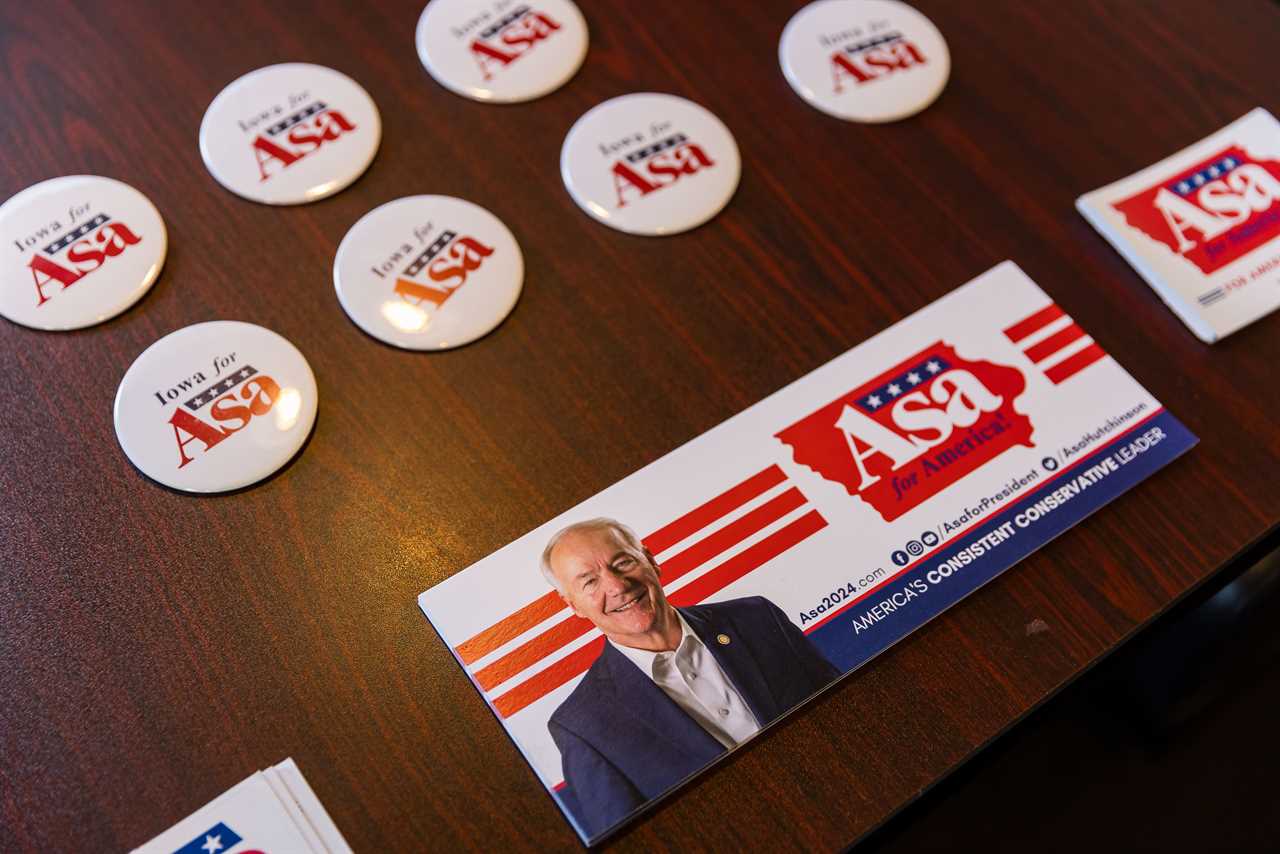
In another era, Asa Hutchinson — whose resume includes stints as a Congressman and U.S. attorney, leading roles at the DEA and Homeland Security, and two terms as a popular red-state governor — would have been a shoo-in for the first debate of a Republican primary, if not an instant contender for the nomination. You might call him the apotheosis of what comedian Bill Maher has dubbed “Republican Classic”: Pro-life, pro-gun, pro-free trade; anti-debt, anti-Putin, anti-coup. But Hutchinson has struggled amid the shifting sands of his party. While policy-wise, he remains mostly in lockstep — as governor, he signed one of the country’s strictest abortion bans — he lacks the fire-breathing, troll-the-libs ethos that animates much of the modern GOP, and has displayed an occasional bipartisan streak (while leading the National Governors Association, he backed President Biden’s infrastructure bill).
More crucially, he broke with Trump after the 2020 election and has emerged as one of the former president’s leading Republican critics. The net result: With less than two weeks until the Aug. 23 parley in Milwaukee, Hutchinson has yet to secure his spot on the debate stage. He’s cleared two of the Republican National Committee’s thresholds — garnering 1 percent in three polls and 200 donors in 20 states — but as of Thursday has just 22,000 of the required 40,000 donors, according to his campaign. Hutchinson has also balked at the RNC’s mandatory loyalty pledge. “I’m not going to vote for [Trump] if he’s a convicted felon,” Hutchinson told POLITICO reporters in June.
Hutchinson’s Trump-bashing has earned heckles from MAGA Republicans and outright mockery from his bête noire. “I call him ‘Ada Hutchinson’,” Trump said at a June Fox News town hall. “I don’t call him Asa. This guy — nobody knows who the hell he is.” In July, at Iowa’s conservative Family Leadership Summit, a visibly unnerved Hutchinson was skewered by moderator Tucker Carlson over his support for the Covid vaccine and veto of a ban on “gender-affirming care” for transgender minors, to the delight of the Trump-friendly audience. Days later, at the young conservative Turning Point Action Conference, he was booed as he took the stage and struggled to deliver his speech over chants of “Trump! Trump! Trump!”

Standing 6’1,” with ramrod posture and his white hair always arranged in a tidy combover, Asa Hutchinson has the look and vigor of someone a decade younger than his 72 years. (Until departing the governor’s mansion in January, he played full-court, 5-on-5 basketball nearly every Friday.) On this morning in New Hampshire, Hutchinson completed his morning hotel-room exercise routine (100 jumping jacks, 50 sit-ups, 20 pushups), donned one of his go-to outfits (blue blazer, white button-down, blue jeans), and is now being driven by his aide to an 8:30 a.m. meet-and-greet. At a cozy café in Bedford, N.H., beside a wall with a framed American flag and two mini-replica “Live Free or Die” license plates endorsing his rival — TRUMP2020, TRUMP2024 — Hutchinson engages in a standing Q&A with the roughly dozen Republicans in attendance. A man in a baseball cap begins by asking what differentiates him from the other candidates.
“Well, first of all, I’ll match my experience against anybody’s,” Hutchinson replies in his heavy Southern drawl. “Whenever you look at the cartels in Mexico, I was head of the DEA in the Bush Administration. That caused me to go to Mexico to meet with Vicente Fox. … I’ve been to the European Commission, negotiated data-sharing agreements so we could protect our country from a terrorist attack. In Congress, that was the last time we balanced the budget in our country.”
“I was impeachment manager, “he adds, “in the impeachment trial of William Jefferson Clinton — from my home state — and so I’ve paid my dues in the conservative political arena.”
Hutchinson proceeds to enumerate his proudest accomplishments as governor— slashing Arkansas’ income tax rate, leaving office with a $2 billion surplus, getting computer-science classes into all public schools, cutting the state workforce by 14 percent and resisting Covid shutdown pressures.
“Every business that provides a job for a family is an essential business, and so I kept them open,” he says, noting that Arkansas came second in the nation in days of in-classroom learning during the pandemic.
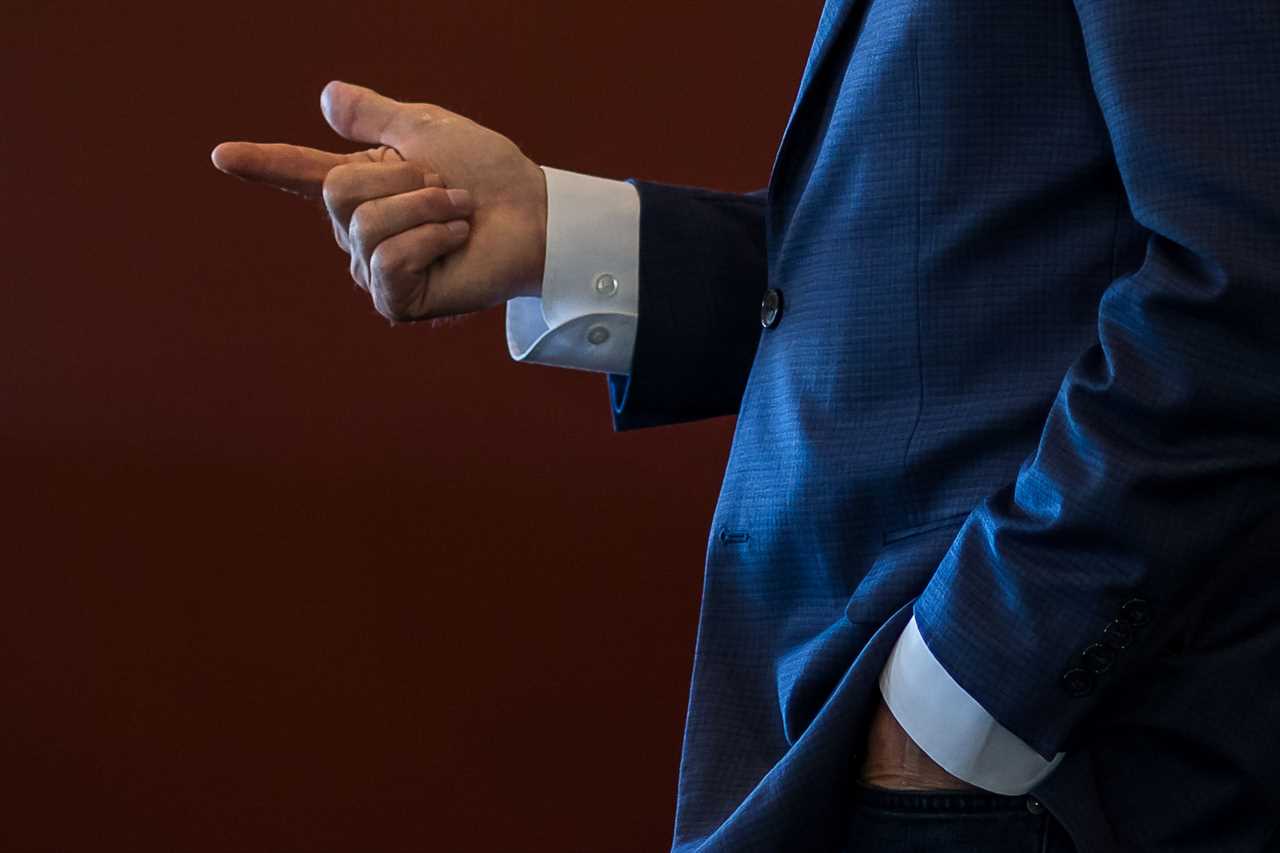
“We beat Florida,” he adds, to a collective chuckle.
The attendees pepper him with typical Republican questions, and Hutchinson responds with typical Republican answers.
Illegal immigration? He wants to ramp up border security and streamline the legal-immigration process.
Ukraine? He’s emphatically for continued U.S. support.
Energy policy? “President Biden made an error in going all green.”
But at nearly every campaign stop, at least one voter is there to remind Hutchinson of the vast chasm between the conservative movement of 2023 and the one that launched him into the political limelight decades ago.
Here, it is a middle-aged woman who asks how he will fix America’s “two-tiered justice system,” echoing Trump’s claim that he is being prosecuted for offenses that Obama and Hillary committed with impunity. An elderly woman chimes in: “How do we know who to believe?”
“Well, it’s hard,” Hutchinson replies. “I don’t excuse former President Trump’s behavior in how he handled classified information. I think those are serious charges. … What bothers me about what Trump’s allegations are is it includes obstruction. I mean, I prosecuted a president of the United States for obstruction of justice. As conservatives, we don’t want to undermine the rule of law.”
With the debate on his mind, Asa Hutchinson is staking his Hail-Mary campaign on the hope that — amid the brewing primary battle between Trump and Trump Lite — there is still a lane for Republican Classic. “I’ll end with the best compliment I’ve gotten so far in the campaign, and it’s from Iowa,” he tells the New Hampshire Republicans. “I’m talking to a constituent … and at the end of it, he looked at me and he said, ‘you know, you seem really normal.’”
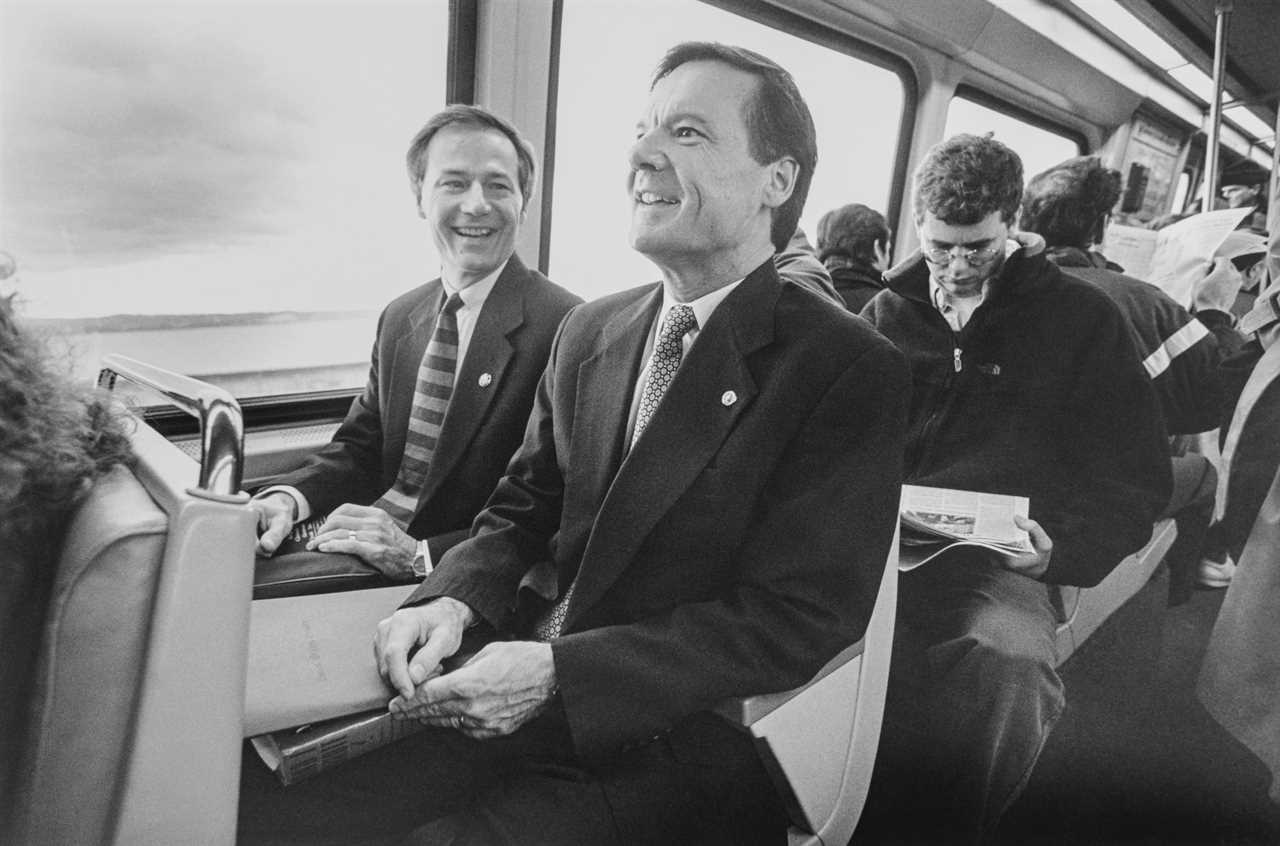
Calling oneself a “Reagan conservative” has long been de rigueur for aspiring Republican politicians. But for Hutchinson, the label fits — and helps explain why Hutchinson, though not initially a Never Trumper, has always been an awkward fit with the MAGA GOP.
Born in December 1950, the youngest of six children, Hutchinson was raised on a 280-acre farm in northwest Arkansas’s Benton County, a stubbornly red corner of a then-solidly blue state. Though his parents were not terribly partisan — the two split their votes in the 1960 Kennedy-Nixon race — a 13-year-old Hutchinson began to identify with the GOP in 1964, when he and elder brother Tim, a future U.S. senator, watched Ronald Reagan deliver his “Time for Choosing” speech in support of Barry Goldwater. Asa followed Tim to the evangelical Bob Jones University in South Carolina and then returned home to attend law school at the University of Arkansas, where he first crossed paths with a young professor named Bill Clinton.
“We ran in different circles,” he remembers.

In 1978, Hutchinson — then practicing law in Bentonville, not far from his parents’ farm — launched the first of what would be several losing campaigns, for prosecuting attorney. But the endeavor wasn’t for naught. He earned the support of Bentonville favorite son Sam Walton, the founder of Walmart, whom he successfully canvassed by knocking on Walton’s office window one Saturday morning. Hutchinson also gained the notice of Arkansas’s embattled Republican bigwigs, who appointed him Benton County GOP chair and, later, Bentonville city coordinator for Reagan’s 1980 campaign. After Reagan narrowly carried Arkansas that year (ousting first-term governor Bill Clinton in the process), Hutchinson angled for an appointment as U.S. attorney in northwest Arkansas, enlisting Walton and others to write letters on his behalf. And in 1982, a 31-year-old Hutchinson became the nation’s youngest holder of that office.
In 1986, he mounted a quixotic Senate bid against popular incumbent Democratic Sen. Dale Bumpers. “I considered him the new far right at the time,” remembers Arkansas Democrat-Gazette columnist John Brummett, who interviewed Hutchinson the day after his announcement. “I grilled him on essentially why someone who went to Bob Jones University — that racist place — would run for the U.S. Senate.” But when Hutchinson debated the “Orator of the Senate,” Brummett and other pundits declared Hutchinson the winner. Despite that performance and the backing of President Reagan, who recorded an Oval Office ad with the 35-year-old candidate, Arkansas’s still-solidly Democratic voters reelected Bumpers in a 25-point landslide.
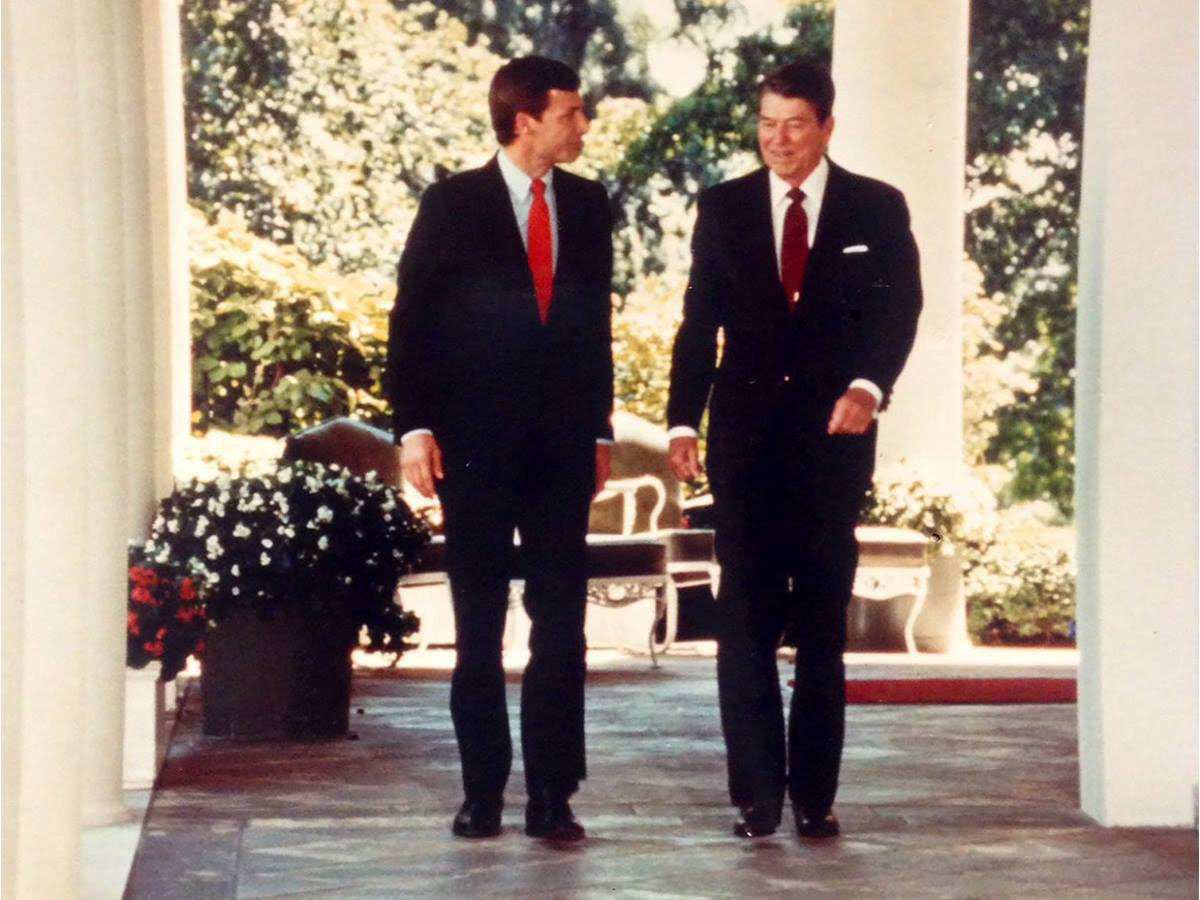
After another failed race for attorney general in 1990 and several years as the Arkansas GOP chair, Hutchinson finally got his big break in 1996. With the state shifting rightward, older brother Tim — by then a U.S. House member — ran successfully for Senate, clearing the way for Asa to win his safely red seat (and for the brothers to share a Pentagon City apartment). Only two years into his tenure, Asa rose to national prominence when he served as an impeachment manager in the case against former President Bill Clinton. Accepting the role raised ire back in Arkansas, where Clinton was still popular, but Hutchinson’s straightforward handling of the legal facts — at odds with the more personal attacks of his fellow managers — earned the respect of some Democrats. Vermont Sen. Patrick Leahy sent him a bottle of maple syrup, and Massachusetts Sen. Ted Kennedy wrote him a complimentary letter.
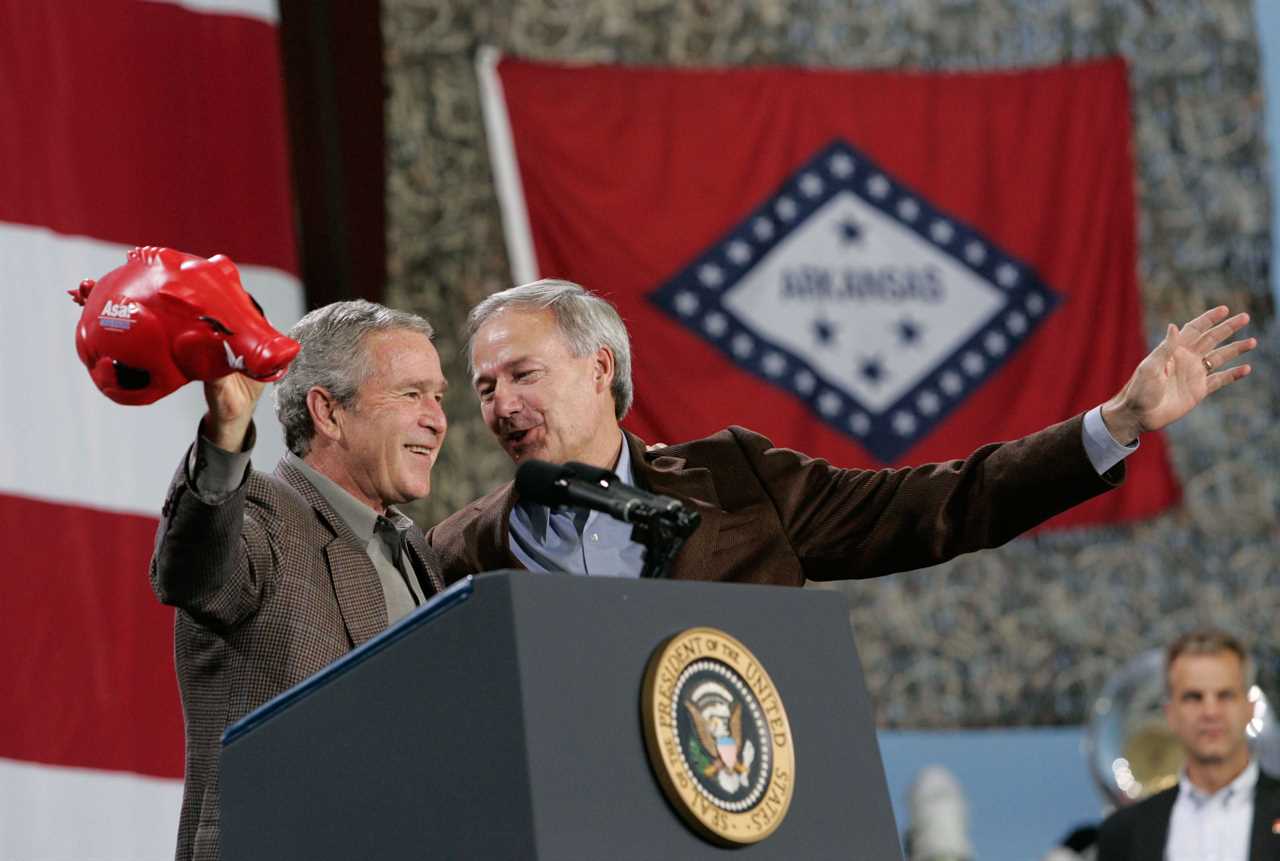
Both Hutchinson brothers backed George W. Bush in the 2000 election, serving as his Arkansas state co-chairs, with Asa assisting in Bush’s Florida-recount effort. The following year, he was appointed head of the Drug Enforcement Agency (he’s a fan of both iterations of Netflix’s “Narcos”), but his time in the role would be short-lived. Sept. 11 came a month after his confirmation, and by early 2003 he was reassigned to the newly created Department of Homeland Security, where he would serve as Undersecretary for Border and Transportation (Secretary Tom Ridge’s effective number-two). It was during this time, Hutchinson says, that he first contemplated a future White House bid: “Anytime you’re sitting by the president of the United States, it gives you an understanding of that office that you never had before.”
But his quick political ascent soon stalled. When Ridge retired following the 2004 election, Hutchinson was passed over for the top job and resigned in disappointment. He moved back home and ran for governor against the state’s popular attorney general, conservative Democrat Mike Beebe, in a campaign The New York Times called “a rather subdued affair — more akin to a collegial tax seminar than a slugfest.” But facing the national tide of the 2006 midterms, defined by the increasingly unpopular Iraq War, Hutchinson lost by 15 points.
Brummett, the Arkansas columnist, published a political obituary: “I wrote, ‘Three-time loser, he’s done. Forget Asa Hutchinson.”
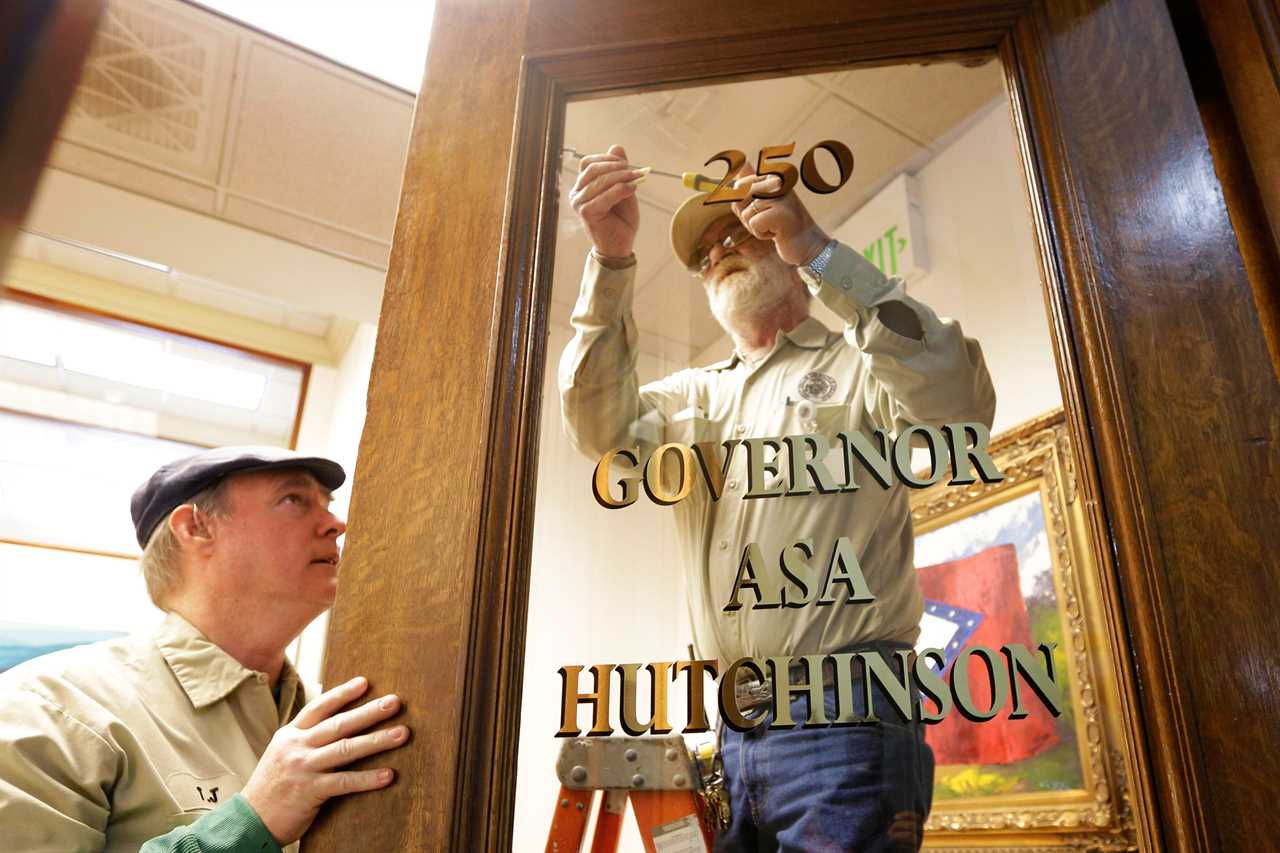
Hutchinson largely disappeared from politics following his 2006 loss, returning to his private law practice and starting a consulting firm that leveraged his DHS experience. (His first foray back into the political spotlight wouldn’t come until 2013, when — following the Sandy Hook shooting — he served as spokesperson for the NRA’s “school-shield” armed-guard proposal.)
But during his political hibernation, Arkansas continued its rightward march. Despite voting for John McCain by a 20-point margin, the state had entered the Obama-era with a Democratic governor, a Democratic legislature and two Democratic U.S. senators. But by 2010, with the backlash over Obamacare and the rise of the Tea Party, Arkansas voters ousted Sen. Blanche Lincoln in a landslide and flipped the legislature to full Republican control for the first time since Reconstruction. Four years later, Hutchinson mounted his comeback.
Hutchinson campaigned (and would largely deliver) on a familiar litany of conservative promises: cutting taxes, erasing regulations and limiting state government. He defunded Planned Parenthood and added work requirements to safety net programs.
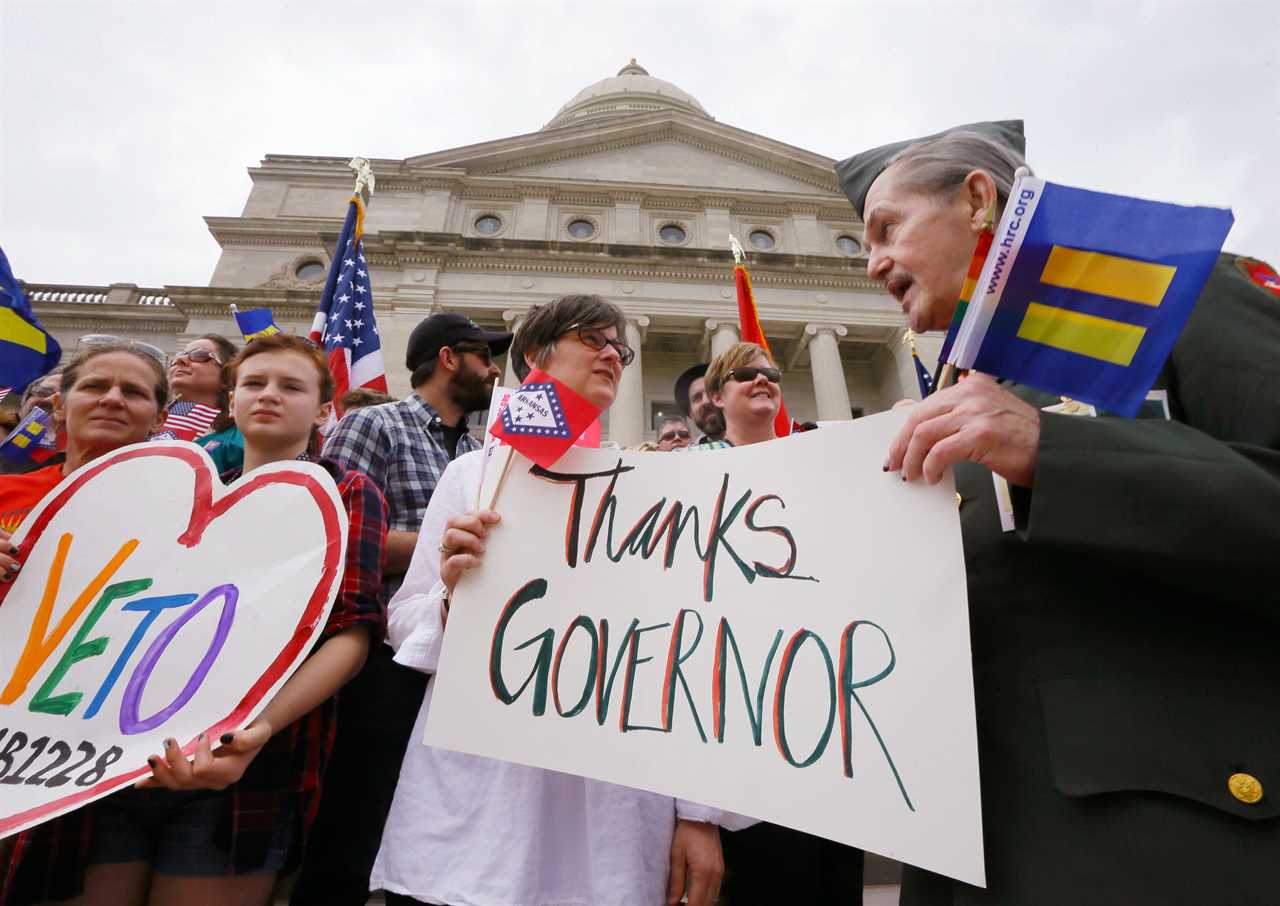
But his two terms would also be punctuated by bouts of pragmatism and principle that put him at odds with Arkansas’ increasingly strident Republican base. Only months after his election, he nixed a “religious freedom bill” — often remembered as the “gay wedding cake” bill — similar to the one Indiana Gov. Mike Pence had signed a few weeks earlier. (The episode presaged another six years later, when he vetoed a bill banning “gender-affirming care” for transgender minors on the grounds that it usurped the rights of parents.) Later in 2015, Hutchinson announced that — despite his opposition to Obamacare — he would continue the Medicaid expansion begun by his predecessor, Gov. Beebe.
“He was a lot more pragmatic than people thought he would be,” says Beebe. “He didn’t succumb to some of the extreme ideology that people feared he would.”
Hutchinson’s pragmatic streak extended to his relations with the emerging Republican presidential frontrunner. Hutchinson, who initially endorsed former Arkansas Gov. Mike Huckabee and later Florida Sen. Marco Rubio for president, had greeted Trump’s rise with a mix of unease and amusement. “I think he’s brought a lot to the table,” he said on Morning Joe the month before the 2016 Iowa Caucuses. “It’s not my message. I worry about the party, in terms of expanding our base and what the message does to our recruitment of Hispanic, outreach to minorities.”
But as Trump vanquished Rubio and his other opponents in contest after contest, Hutchinson reconciled himself to the inevitable, making a pilgrimage to Trump Tower — along with Chris Christie and the governors of Alabama and Mississippi — to pledge his support. Onstage at the 2016 Republican convention, Hutchinson delivered a full-throated (yet unwittingly ominous) endorsement: “When it comes to being commander-in-chief,” he said, “we don’t need a president who — in the word of the FBI — is extremely careless in the handling of classified material. Donald Trump represents a different kind of leadership.”
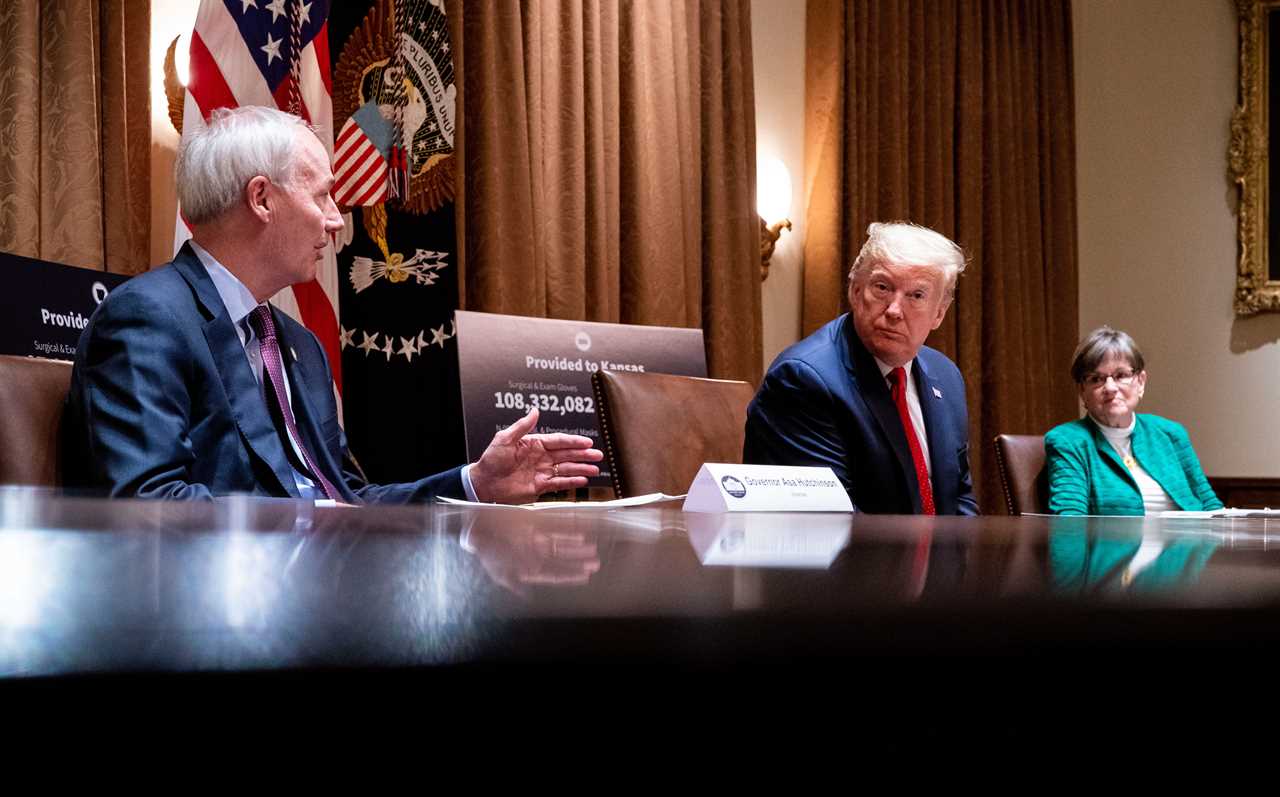
Hutchinson became a frequent guest at the Trump White House. During one dinner for Republican governors, the president took his guests upstairs on an impromptu tour of the Lincoln Bedroom. Hutchinson, a history buff, marveled at the storied past of the room. Trump’s attention, he remembers, was directed elsewhere: “He said, ‘Look at this chandelier up here. This was not really put in properly.’” Despite their divergent personalities, Hutchinson says Trump was “very good” at getting back to him when he needed assistance. “I’d leave my number, and he calls you back,” Hutchinson remembers. “Of course, the most important thing in the conversation would be to tell him how high his poll numbers were in Arkansas.”
In 2018, Hutchinson faced a surprisingly robust primary challenge from the right in advance of his reelection campaign. But any concerns were assuaged when, a day before the vote, @RealDonaldTrump tweeted an endorsement: “He has done an incredible job with a focus on lower taxes, border security, and crime prevention. Asa loves our military and our veterans. I fully endorse Asa for Governor!”
Reelected in a landslide, along with an increased Republican supermajority in both houses, Hutchinson went to work in 2019 passing a conservative wish list, including a six-week abortion ban “trigger law,” which eventually went into effect after the Supreme Court’s 2022 reversal of Roe v. Wade.
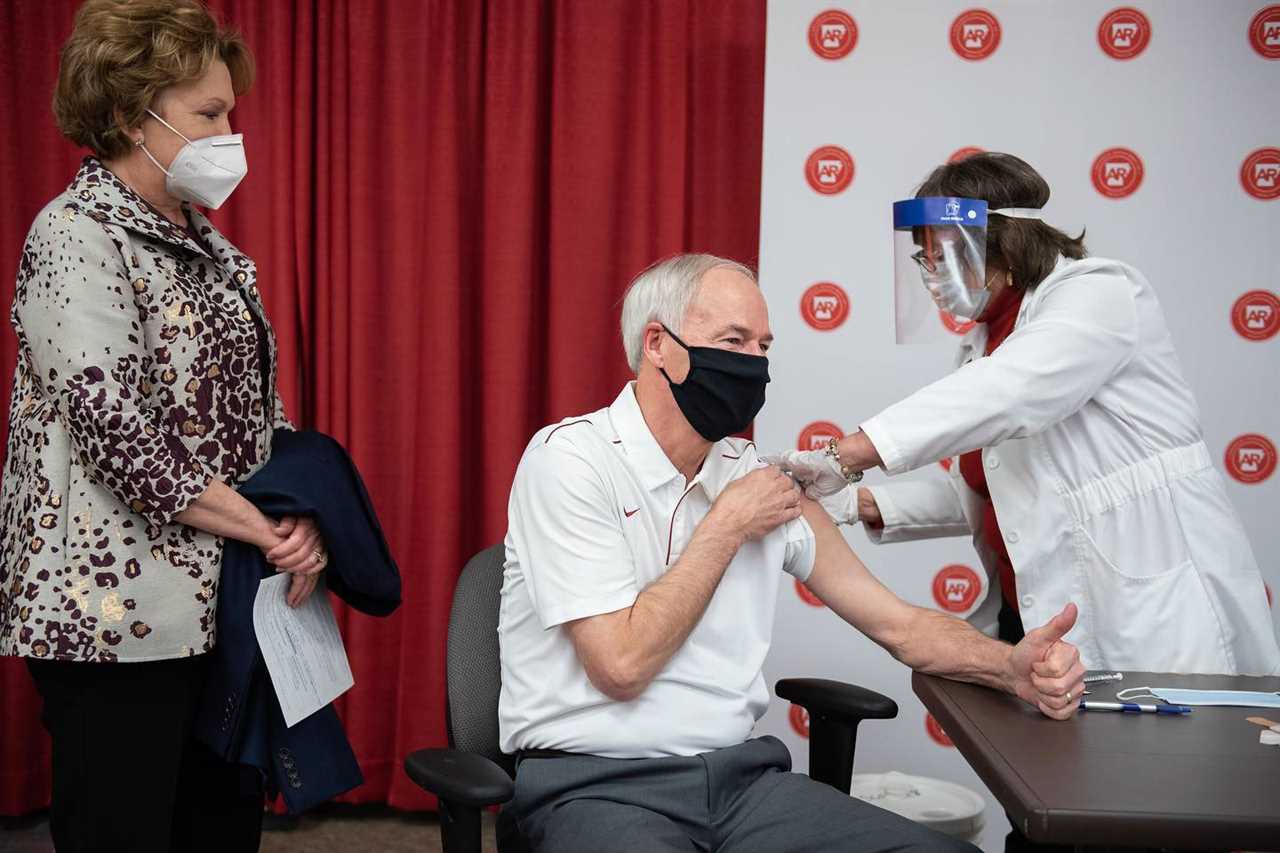
But as the new decade began, Hutchinson’s attention shifted to the mysterious virus emerging from Wuhan, China. Though he would later distinguish himself as a leading Republican vaccine advocate, in 2020 he initially aligned himself with his party’s lockdown skeptics, refraining from issuing a shelter-in-place order and reopening businesses at a faster clip than Trump wanted. “We had a call [with the governors],” Hutchinson remembers, “and I’ll just never forget him rebuking [Georgia Gov.] Brian Kemp for opening up tattoo parlors.” By the fall, Arkansas schools were back in session.
In May 2020, Trump hosted Hutchinson — along with Kansas Democratic Gov. Laura Kelly — at the White House to tout the administration’s pandemic response. “It’s an honor to have Asa,” Trump said at the press conference. “We all know Asa and he’s been doing a tremendous job.” Seated next to Trump, a smiling Hutchinson saluted the president’s approach: “I want to thank you for your leadership on the economy. The message that you have that we need to get back to work, get back to business, is critical in terms of shaping the direction of our country. In Arkansas, we’re back to work.” Behind closed doors, however, Hutchinson was losing patience with Trump’s irresponsible messaging and hands-off approach. “He was getting frustrated that the president was not more involved in the conversations with the governors,” remembers Alison Williams, Hutchinson’s former chief of staff.
After Election Day 2020, Hutchinson initially defended Trump’s right to press legal challenges against the validity of the vote, even as he became alarmed by Trump’s escalating rhetoric. On Nov. 15, when Trump tweeted that President Joe Biden “won because the election was rigged,” a wishful Hutchinson told NBC: “It was good actually to see President Trump tweet out that [Biden] won. I think that’s the start of an acknowledgment.” (Trump quickly clarified himself: “He only won in the eyes of the FAKE NEWS MEDIA. I concede NOTHING!”)
As Trump’s legal challenges were thrown out by court after court, Hutchinson encouraged fellow Republicans to accept the results. In December, he joined a bipartisan group of governors on a call with the Biden transition team and publicly distanced himself from his attorney general, who signed onto Trump’s last-ditch legal efforts. “It’s the tradition of our country and the history of our democracy that we do move on beyond that hard-fought election,” Hutchinson The New York Times","link":{"target":"NEW","attributes":[],"url":"https://www.nytimes.com/2020/12/12/us/politics/republicans-trump-supreme-court-.html","_id":"00000189-e3fd-d4df-a1ab-ebfdd9ac0001","_type":"33ac701a-72c1-316a-a3a5-13918cf384df"},"_id":"00000189-e3fd-d4df-a1ab-ebfdd9ac0002","_type":"02ec1f82-5e56-3b8c-af6e-6fc7c8772266"}">told The New York Times in December, “and we unite and we recognize the president-elect’s leadership.” As the crowds broke into the Capitol on Jan. 6, he took to Twitter to call them “reprehensible.”
On the campaign trail this year, Hutchinson seems amused that there is less criticism of Trump from his challengers than from former members of his own administration, citing former U.S. Attorney General Bill Barr and the many others who have run afoul of the former president.
“Jeff Sessions,” he says, referencing Trump’s first attorney general who was fired in 2018. “He was one of the first to endorse Trump. Trump turns on him and ridicules him. He appoints these people. He selects these people. He’s the most disloyal person to those who have been loyal to him. You look at how he fires people on Twitter. How do you treat people [like that]?”
Asked to pinpoint the moment that he definitively decided to break with Trump, Hutchinson doesn’t bring up Jan. 6, but rather Jan. 8 — the day Trump announced he would not attend Biden’s inauguration.
“When I heard that,” he says, “I knew he had failed our democracy.”
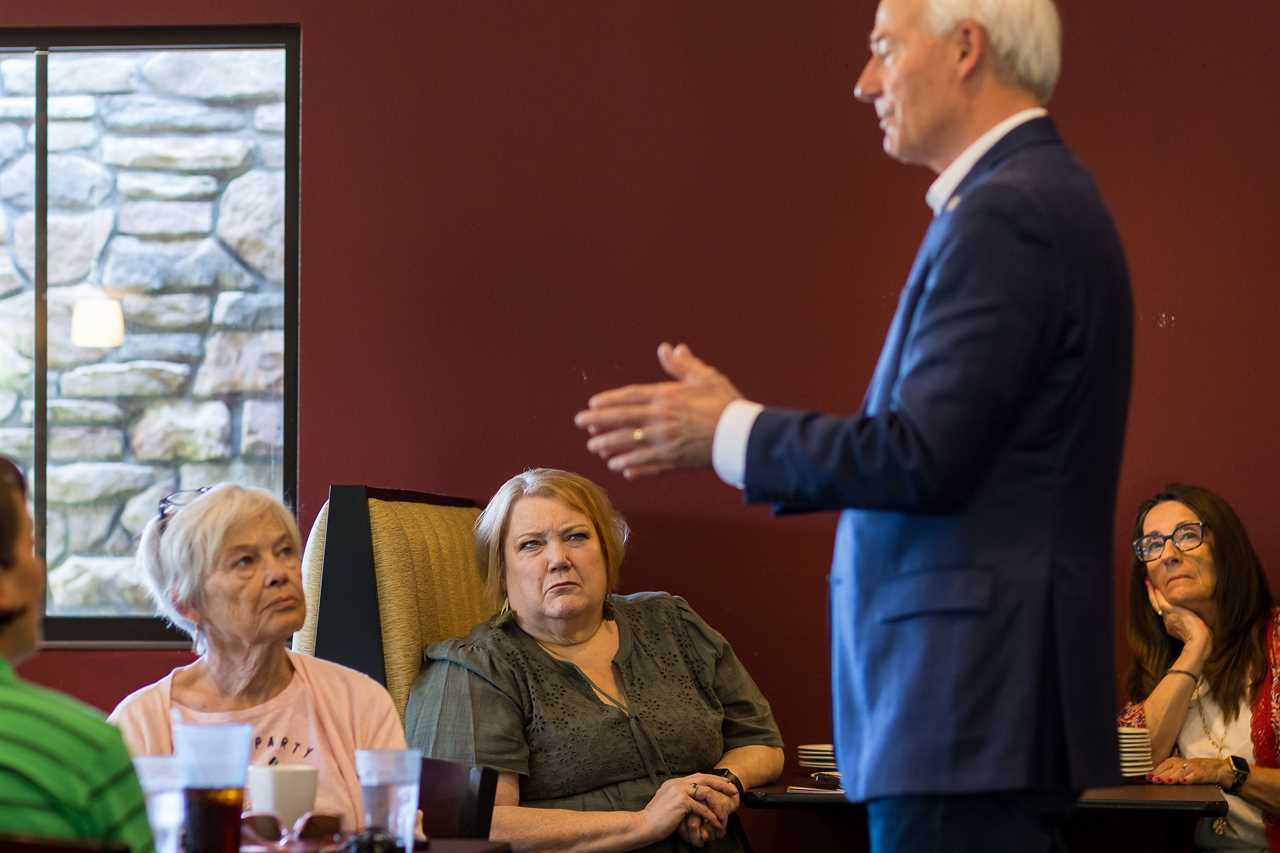
Bella Sera Restaurant — a brick-clad, highway-side pizzeria in Denison, Iowa, (population: 8,172) — doesn’t look like the stuff of presidential campaign lore. But thanks to Denison resident Gwen Ecklund, chair of the Iowa Federation of Republican Women, it has become a pilgrimage site for 2024 candidates. In March, approximately 100 locals packed the restaurant to hear Ramaswamy. Two weeks later, a similar crowd flocked to see Haley. In late June, flyers went out for another edition of “Pizza and Politics” with Hutchinson.
This Tuesday afternoon, a buoyant Hutchinson — fresh off a busy morning complete with visits to a Hy-Vee, a hydraulic-lift factory and an ethanol plant — enters the pizzeria oozing enthusiasm, playfully schmoozing with Ecklund and the other ladies staffing the welcome table near the hostess stand.
An uneasy Ecklund, almost whispering, breaks the news to Hutchinson: “We’re not probably going to get as big a crowd as we normally do.”
The candidate walks into the carpeted main hall of the pizzeria, where two long tables are immaculately set with silverware, plates and hot pies to accommodate a group of 30. Just two women are seated.
Hutchinson, acting unfazed, walks over and greets the pair, as a few more women trickle in.
Hutchinson turns to Ecklund. “What time is this supposed to begin?”
“2 p.m.” It’s already a few minutes past.
“Are you expecting any more people to come?”
She shoots Hutchinson a pained expression — “I’m sorry” — and then glances out the window. “Oh, here comes somebody.”
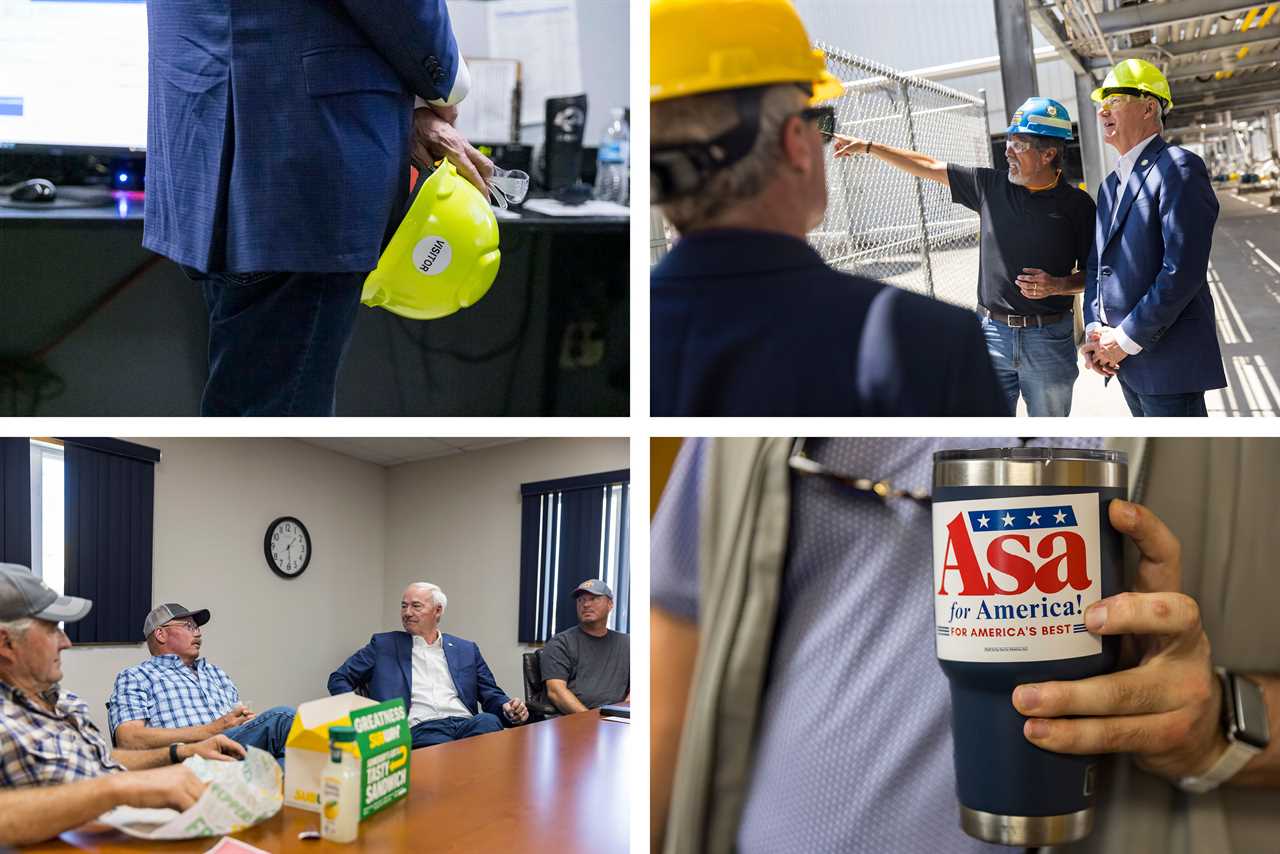
If one were to draw a composite of the five last pre-Trump winners of the Iowa Republican Caucus, he might look awfully like Asa Hutchinson — a candidate with the blue-collar roots of Rick Santorum, the Arkansas folksiness of Mike Huckabee, the compassionate conservatism of George W. Bush, the establishment sensibilities of Bob Dole and the eclectic resume of George H.W. Bush. But in post-Trump Iowa, Hutchinson at times has the feel of a door-to-door salesman hawking Encyclopedia Britannicas in Silicon Valley.
At the pizzeria, Ecklund introduces a smiling Hutchinson, who addresses the room of 15 (a number that includes a CNN reporter, myself and two photographers).
Most Hutchinson stump speeches follow the same general script. After cursory comments about the wonderful state or community he is in, he moves through his bio, sprinkling in laugh lines that land better in some venues than others.
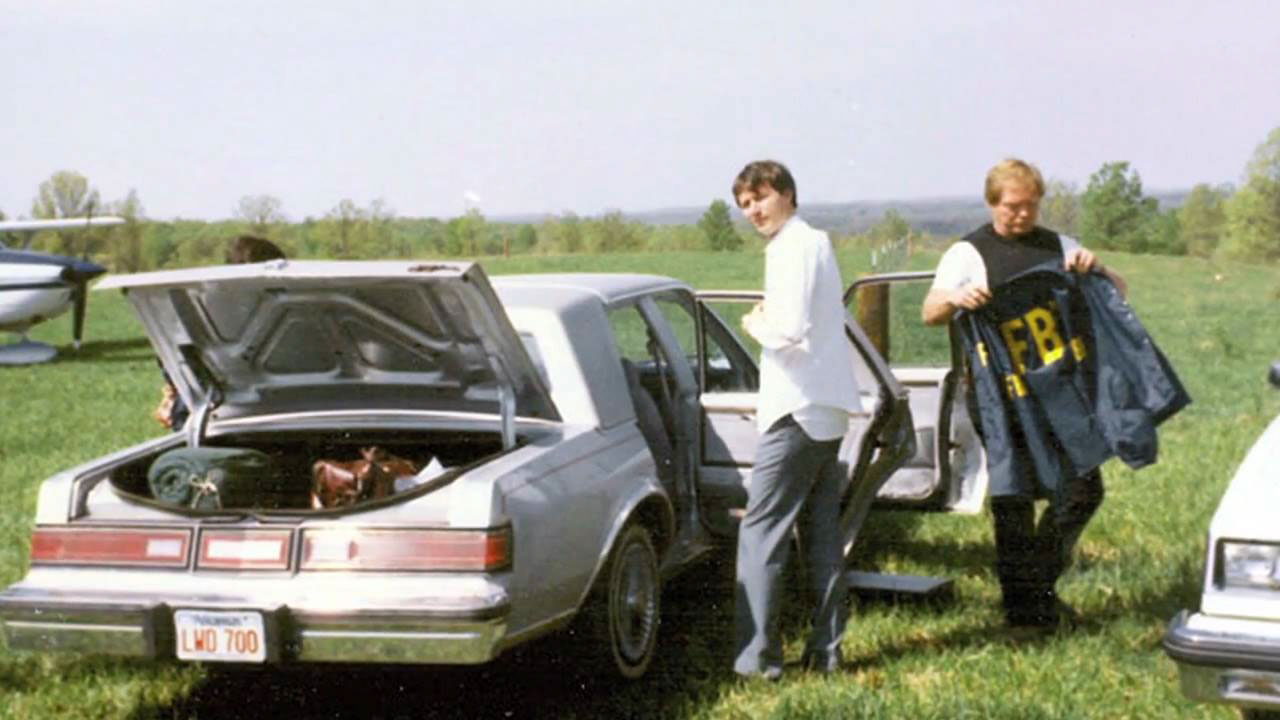
On negotiating the surrender of a white supremacist cult leader in a 1982 standoff when he was a U.S. attorney: “They threw me a bulletproof vest and said, ‘You might need this.’ And I said to myself, ‘This is not why I went to law school.’”
Hutchinson then plows through the highlights of his gubernatorial record before giving an overview of his policy agenda. In Iowa, unlike New Hampshire, he speaks about his faith and leans into culture-war issues, decrying Biden’s “leftist social agenda” and advertising Arkansas’ bans on abortion and “biological males” competing in women’s sports.
For a candidate known for his opposition to Trump, Hutchinson rarely mentions the former president by name. But somewhere, somehow, he addresses the elephant in the room.
“I understand the justice system,” he says at the pizzeria. “I also understand it’s not a perfect system. In fact, I practiced law for a long time, and I would tell clients, ‘If you want perfect justice, you’re going to have to wait to heaven.’ We’ve got a human system, but it’s a pretty good human system. And it’s the part of America, our democracy, that sets us apart. We should never forget that.”
Hutchinson closes with his usual appeal, asking the women to visit his website and donate to get him on the debate stage — “a dollar counts” — and then asks the room if anyone has questions. One hand goes up. “One of my biggest concerns is the deep state,” an elderly woman tells Hutchinson. “First of all, do you believe in the deep state?”
Hutchinson pauses a couple seconds before offering a hesitant “yes.”
“I mean, I’ll define ‘deep state,’” he continues. “Deep state are, uh, career bureaucrats, uh, that, uh, do not pay attention to the laws set by Congress, and they try to set their own rules. And they believe that they can outlive and outlast any chief executive. That to me is the deep state.”
Leaving it there, he engages in a back-and-forth with the same woman over his plan to cut 10 percent of the federal workforce.
But, suddenly unsatisfied with his answer, he clarifies: “Let me say, I mean, I’ve worked with the DEA. We’ve got bureaucracy in the DEA. In Homeland Security, we had 110,000 people reporting to me. These, some people would call bureaucrats, but the professional law enforcement, the professional people that care about our country — they work very, very long hours — and so I don’t want to demean people that are working for our government in different positions.”
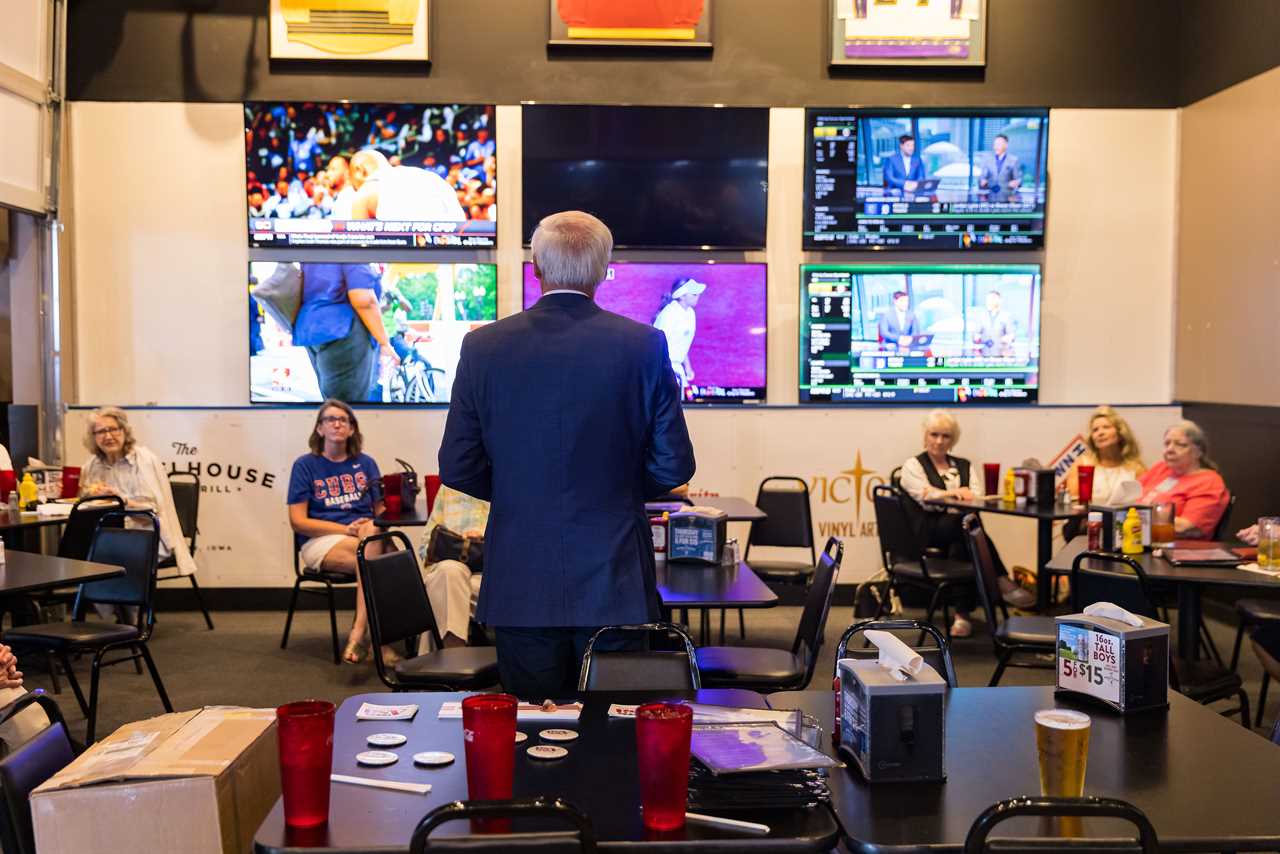
A few hours later, at a dimly lit sports bar in Sioux City, Iowa, Hutchinson addresses a much livelier crowd of 20-plus Iowans. Standing opposite a wall with several TV sets shuffling between ESPN and ads for his competitors, a suddenly reenergized Hutchinson talks up his fiscal record. As he touts his efforts on taxes —"went from 7 percent down to 4.9 percent; $700 million a year going from state coffers back to private citizens” — he starts to find a receptive audience.
But as the Q&A begins, the conspiracy-tinged element of modern conservative politics that Hutchinson prefers to avoid impedes again. A middle-aged blond woman asks: “How do we keep our faithful rallied and encouraged when many people will be like, ‘It doesn’t matter anyway because they’re going to cheat their way in?”
Hutchinson initially dodges. “Well, the answer to that is, ‘Look at Iowa.’ Iowa’s incredible. I mean, it wasn’t the best year politically, but Iowa had a great year. ... So you won! Conservatives won! The message won! You had good candidates. The legislature has done a great job in there. In Arkansas, we gained, but it was states like Pennsylvania that, quite frankly, we had bad nominees.”

But, sensing the woman’s dissatisfaction, he tosses her some red meat, talking up the voter ID laws he and other red state governors have signed in recent years. “But we’ve got to watch some of the blue states that open it up and have less integrity in terms of checks and balance in their voting systems. So we’ve got our work to do there.”
The following afternoon, after another well-received talk to roughly 25 neon-green-shirted employees of an energy cooperative in Harlan, Iowa, a handful of attendees queue up to speak to Hutchinson.
“So, tell me,” he says to one. “You don’t have to hurt my feelings, but who’s your top 3?”
The woman says she’s been following Robert Kennedy Jr. a bit.
“Interesting!” exclaims Hutchinson.
“He’s pretty right-sided for being a Democrat,” she says, then names Tim Scott.
“He’s got a good story,” Hutchinson agrees.
“What I like about him — along with your background — it seems rural, or small town. Wasn’t born with a silver spoon in his mouth.”
Hutchinson nods: “We need more blue-collar candidates, versus blue-blood candidates.”
The woman adds that she supported Trump last time and may again. “I guess right now those would be my 3, but it’s so good to know about you.”
“Yeah, keep an eye on me.”
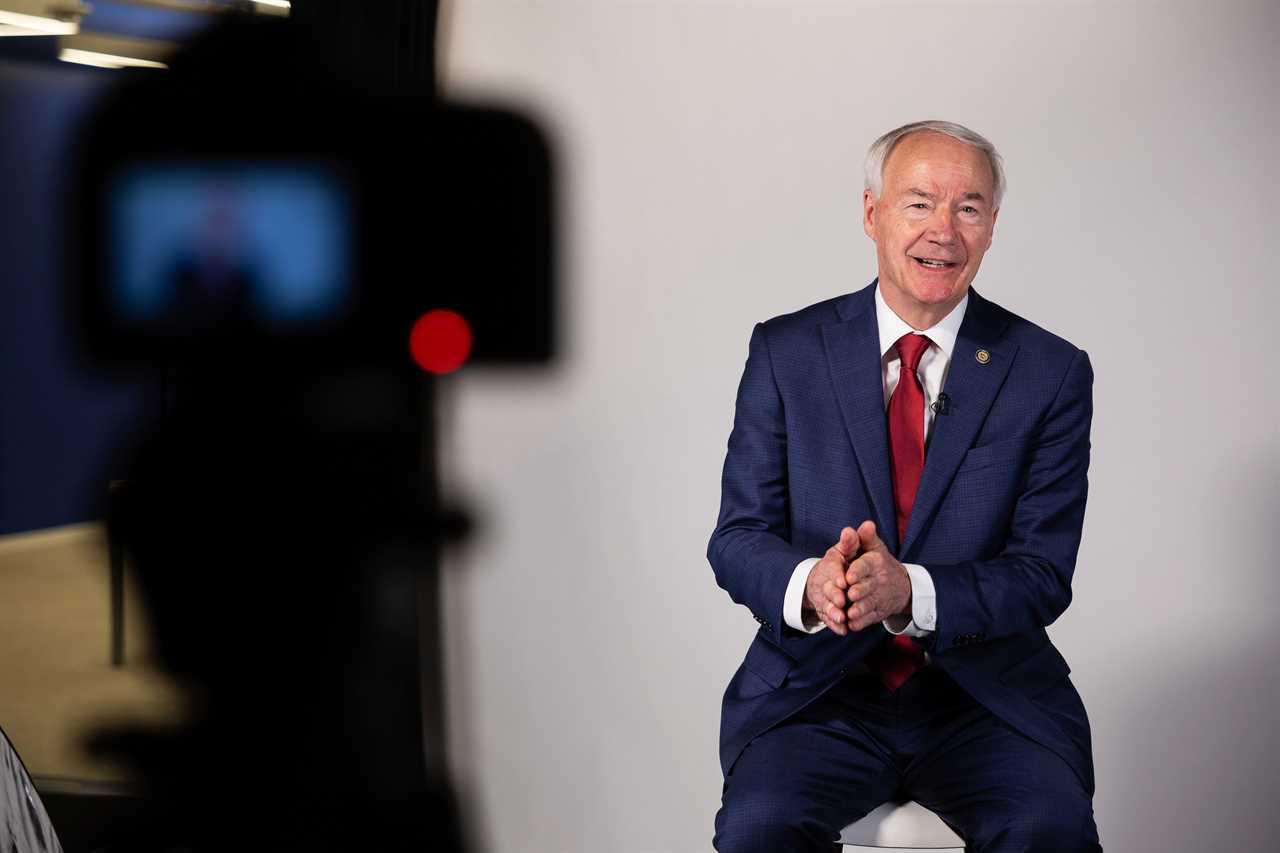
In some quarters of the country, Asa Hutchinson has by now become a household name — that is, in households that get their news from CNN, ABC News and other mainstream outlets, where Hutchinson has become a ubiquitous presence, a cherished if pitied voice of reason for those who bemoan the Trumpification of the GOP. “Right now,” Bebee says, “Democrats, independents and many Republicans are looking at him to say that he’s got some courage.”
Hutchinson is an equally known, if despised, commodity among hardcore MAGA Republican activists. But speaking to normal, less politically engaged Iowa Republicans who encounter the former governor, it becomes evident that, to a degree, Trump is right about “Ada”: Before coming to hear him, “nobody knows who the hell this guy is.”
“I don’t hear negatives,” says one Iowa GOP official who requested anonymity to share a candid assessment. “I just don’t hear a lot.”
It’s a double-edged sword. Without a sudden surge in name recognition, Hutchinson will struggle to get the remaining donors he needs to make the Milwaukee debate.
On the flip side, flying under the radar (and largely out of Trump’s crosshairs) has given Hutchinson something that former Vice President Mike Pence, Chris Christie and other better-known anti-Trump candidates don’t have: the opportunity to make a first impression, on his terms. “When he shows up someplace and people talk to him, they’re suitably impressed,” says former Iowa House Speaker and current state Rep. Brent Siegrist, who has endorsed DeSantis. “They like the message, they like the executive experience. I would say it’ll be difficult for him to finish in the top three. But Iowa’s about exceeding expectations, and so if he maybe finished fourth or fifth and beat Christie and a few others, he might have a little more life in New Hampshire.”
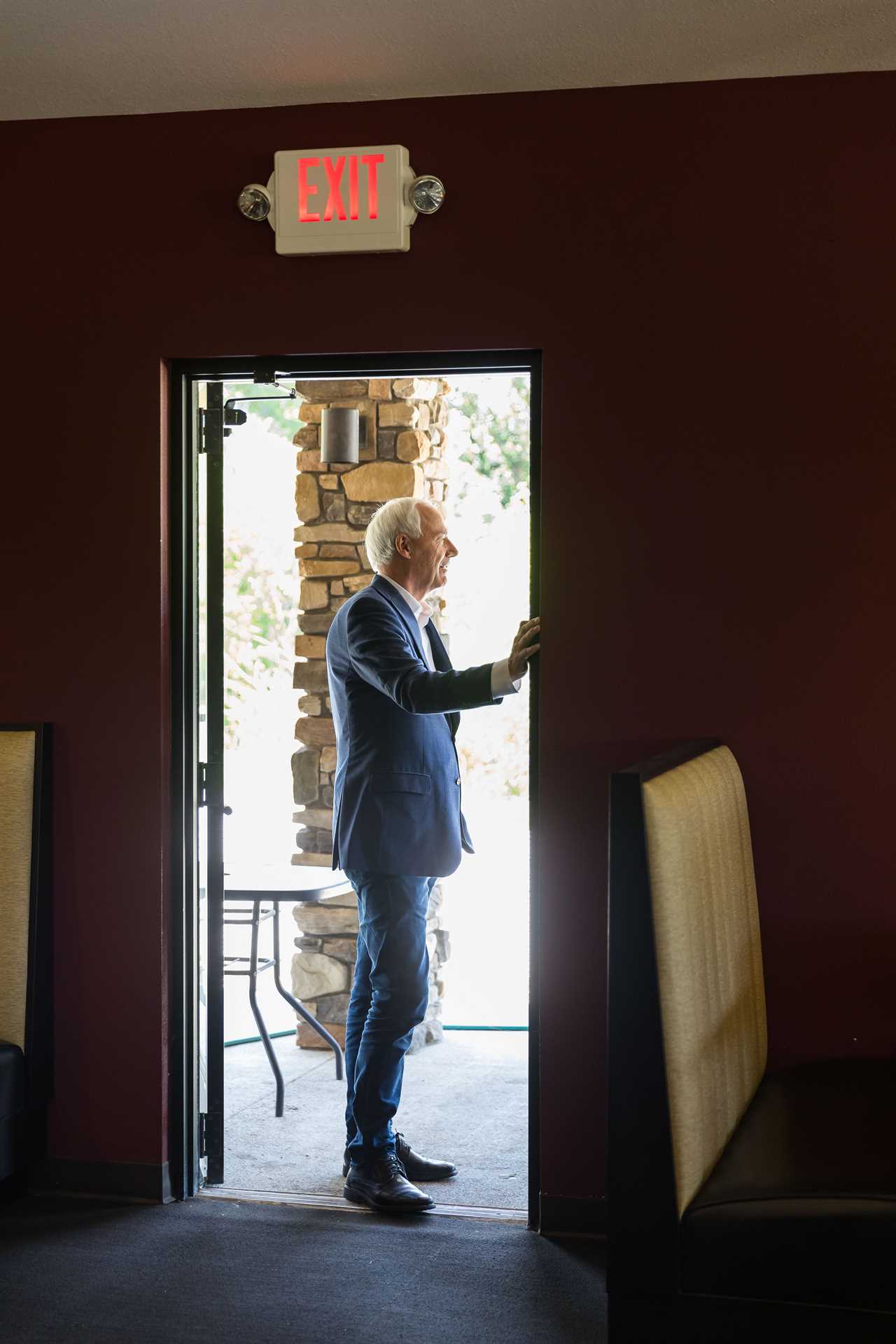
For the last stop of Hutchinson’s late-June Iowa swing, state director Taylor Mattox drives the candidate nearly three hours — past innumerable cornfields and wind farms — to Marcus, a town of 1,038 not far from Iowa’s border with South Dakota. Arriving with a half-hour to spare and a hungry Hutchinson, Mattox drives the ghost-town streets of Marcus in search of a lunch spot. Pizza Ranch, the only restaurant in sight, appears closed, so we pull into Jeff’s Foods — the town’s only grocery store — to forage for sustenance. Exiting Mattox’s white SUV in the blazing heat, Hutchinson dons his white Asa 2024 baseball cap and strides through the entrance. He takes a long look around the quiet, air-conditioned grocery store, and — eager to squeeze every last bit of toothpaste out of his campaign-trail tube — introduces himself to the cashier.
“Nice to meet you,” she says. “Where are you from?"
“Arkansas. I’m the former governor of Arkansas.”
“Oh, OK.”
“Eight years there, I was in Congress, I was head of the DEA.”
“Nice to meet you.”
Hutchinson spots an older woman nearby: “I didn’t say hi to you. You look like a wonderful lady from Iowa. I’m Asa Hutchinson. I’m running for president.”
“Oh, nice to meet you, sir.”
“It’s great to be in the community,” he says. “I was the former governor of Arkansas, just finished eight years there, and Iowa is very important right now. You get to decide.”
“Yes,” she replies. “They’re trying hard to take it away from us.”
“Well, I’m for it. I’m on the Republican side. We’ll be here.”
“Nice to meet you,” she says. “Please defeat Trump no matter what.”
“Yes, yes, that’s why I’m running. We want alternatives.”
Hutchinson goes on to greet each shopper — one by one, aisle by aisle — before I lose sight of him. He’s in the back office, chatting up Mike the Manager — just one more potential dollar on the road to Milwaukee.
----------------------------------------
By: Ben Birnbaum
Title: Asa Hutchinson Was a GOP Star. Then Came Donald Trump.
Sourced From: www.politico.com/news/magazine/2023/08/11/asa-hutchinson-post-trump-republican-candidate-00110698
Published Date: Fri, 11 Aug 2023 03:30:00 EST






